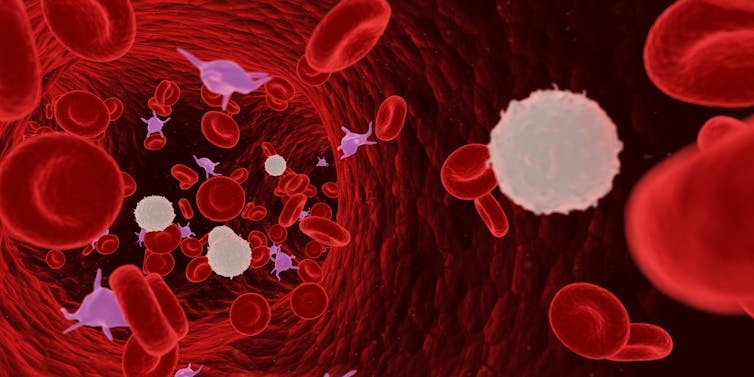how does our blood fight viruses like chicken pox and colds?
- Written by Archana Koirala, Paediatrician and Infectious Diseases Specialist, University of Sydney
 If you have a question you’d like an expert to answer, send it to curiouskids@theconversation.edu.au.
How does our blood fight viruses like chicken pox, sickness and colds? - Teddy, 5, Oxfordshire, England.
Our bodies are made up of building blocks called cells. They are different sizes and colours and join together to become organs like the skin, brain and lungs.
Some cells travel around our body and work to move food and waste.
Other cells work for the immune system, which is the body’s protection system. The mucous (or snot) and the tiny hairs in your nose and throat are a part of your immune system. Snot traps germs before they get too far into your body. The tiny hairs in your nose and throat tickle when they feel a germ, making your body cough or sneeze the germ out.
But if a germ makes it past the first layers of protection and into your blood, they will meet an army of special immune system cells that have one job: to fight germs.
Read more:
Curious Kids: How does pain medicine work in the body?
Red and white blood cells
It helps to think of our blood like a soup, a mixture of different ingredients. The main ingredients are red blood cells and white blood cells.
The red cells give our blood its colour. They carry a thing called oxygen from our lungs to the rest of the body.
If you have a question you’d like an expert to answer, send it to curiouskids@theconversation.edu.au.
How does our blood fight viruses like chicken pox, sickness and colds? - Teddy, 5, Oxfordshire, England.
Our bodies are made up of building blocks called cells. They are different sizes and colours and join together to become organs like the skin, brain and lungs.
Some cells travel around our body and work to move food and waste.
Other cells work for the immune system, which is the body’s protection system. The mucous (or snot) and the tiny hairs in your nose and throat are a part of your immune system. Snot traps germs before they get too far into your body. The tiny hairs in your nose and throat tickle when they feel a germ, making your body cough or sneeze the germ out.
But if a germ makes it past the first layers of protection and into your blood, they will meet an army of special immune system cells that have one job: to fight germs.
Read more:
Curious Kids: How does pain medicine work in the body?
Red and white blood cells
It helps to think of our blood like a soup, a mixture of different ingredients. The main ingredients are red blood cells and white blood cells.
The red cells give our blood its colour. They carry a thing called oxygen from our lungs to the rest of the body.
 It’s best to think our our blood like soup. The main ingredients are red and white cells.
www.shuttershock.com, CC BY
The white blood cells act as an army of fighting soldier cells that attack germs. They are fast, strong and smart.
They can squeeze out of the blood and travel into the nose or throat cells, capture germs and even swallow them.
White blood cells have a cool trick to help them recognise and fight germs: they “wear” the broken parts of germs like a badge. This helps other white cells know what the bad cells look like, so they can stop the bad cells if they come back.
Do you remember going to the doctor and getting a needle in your arm? The doctor was probably injecting a vaccine into your blood. The vaccine has a germ that’s been changed so it won’t hurt you – like a tiger with no teeth. The vaccine helps your immune system learn to recognise that germ if the real, more dangerous version came along.
Some viruses are smart and can change their appearance so white cells can’t remember them. This is why you can get the cold or the flu more than once.
Sometimes the white cells will eat the viruses. Other times they will shoot powerful balls called antibodies at the bad cells. These balls stick to the bad cells and make them very weak, which stops them moving around your body.
It’s best to think our our blood like soup. The main ingredients are red and white cells.
www.shuttershock.com, CC BY
The white blood cells act as an army of fighting soldier cells that attack germs. They are fast, strong and smart.
They can squeeze out of the blood and travel into the nose or throat cells, capture germs and even swallow them.
White blood cells have a cool trick to help them recognise and fight germs: they “wear” the broken parts of germs like a badge. This helps other white cells know what the bad cells look like, so they can stop the bad cells if they come back.
Do you remember going to the doctor and getting a needle in your arm? The doctor was probably injecting a vaccine into your blood. The vaccine has a germ that’s been changed so it won’t hurt you – like a tiger with no teeth. The vaccine helps your immune system learn to recognise that germ if the real, more dangerous version came along.
Some viruses are smart and can change their appearance so white cells can’t remember them. This is why you can get the cold or the flu more than once.
Sometimes the white cells will eat the viruses. Other times they will shoot powerful balls called antibodies at the bad cells. These balls stick to the bad cells and make them very weak, which stops them moving around your body.
 You might get a fever when you are sick. White cells work better when your body temperature is a bit higher than normal.
www.shuttershock.com, CC BY
How to help your body fight a virus
Fighting bad cells can cause your body to get very hot and you can get a fever. This is because white cells work better when your body temperature is higher than normal.
You might also get rashes, aches and pains and feel really unwell. It is important to drink lots of water (or warm soup) and rest. Resting helps your body recover from all the fighting that the soldiers in your body have done.
Read more:
Curious Kids: Why does my snot turn green when I have a cold?
Hello, curious kids! Have you got a question you’d like an expert to answer? Ask an adult to send your question to curiouskids@theconversation.edu.au
You might get a fever when you are sick. White cells work better when your body temperature is a bit higher than normal.
www.shuttershock.com, CC BY
How to help your body fight a virus
Fighting bad cells can cause your body to get very hot and you can get a fever. This is because white cells work better when your body temperature is higher than normal.
You might also get rashes, aches and pains and feel really unwell. It is important to drink lots of water (or warm soup) and rest. Resting helps your body recover from all the fighting that the soldiers in your body have done.
Read more:
Curious Kids: Why does my snot turn green when I have a cold?
Hello, curious kids! Have you got a question you’d like an expert to answer? Ask an adult to send your question to curiouskids@theconversation.edu.au
Authors: Archana Koirala, Paediatrician and Infectious Diseases Specialist, University of Sydney





